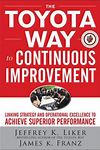After being involved with Lean Manufacturing in a number of roles over the past twenty years, one resource I might offer to the lean community is a compilation of essential lean books that have helped me in my journey.
To be fair, there are probably hundreds of lean books available on the market. I am finishing my own book and will try and publish it later this year. But the lean books I recommend are books that I have actually used and find helpful.
Note: I do get requests from people on a regular basis to recommend one thing or another on my various pages. Please save yourself some time and don’t ask me to plug your book here. I am recommending the ones I have listed because I have used them and they have worked.
Also note: I have not linked to any of the web site that sells these books… you can do a quick Google or Bing Search and find any number of outlets to purchase them from.
And now, your journey into Lean Resources Begins (or continues)
The granddaddy of them all for me was:
THE MACHINE THAT CHANGED THE WORLD
“When The Machine That Changed the World was first published in 1990, Toyota was half the size of General Motors. Today Toyota is passing GM as the world’s largest auto maker and is the most consistently successful global enterprise of the past fifty years. This management classic was the first book to reveal Toyota’s lean production system that is the basis for its enduring success.
Now reissued with a new Foreword and Afterword, Machine contrasts two fundamentally different business systems — lean versus mass, two very different ways of thinking about how humans work together to create value. Based on the largest and most thorough study ever undertaken of any industry — MIT’s five-year, fourteen-country International Motor Vehicle Program — this book describes the entire managerial system of lean production.
Nearly twenty years ago, Womack, Jones, and Roos provided a comprehensive description of the entire lean system. They exhaustively documented its advantages over the mass production model pioneered by General Motors and predicted that lean production would eventually triumph. Indeed, they argued that it would triumph not just in manufacturing but in every value-creating activity from health care to retail to distribution.
Today The Machine That Changed the World provides enduring and essential guidance to managers and leaders in every industry seeking to transform traditional enterprises into exemplars of lean success.”
Learning to See
“Value-stream maps are the blueprints for lean transformations and Learning to See is an easy-to-read, step-by-step instruction manual that teaches this valuable tool to anyone, regardless of his or her background.
This groundbreaking workbook, which has introduced the value-stream mapping tool to thousands of people around the world, breaks down the important concepts of value-stream mapping into an easily grasped format. The workbook, a Shingo Research Prize recipient in 1999, is filled with actual maps, as well as engaging diagrams and illustrations.
The value-stream map is a paper-and-pencil representation of every process in the material and information flow, along with key data. It differs significantly from tools such as process mapping or layout diagrams because it includes information flow as well as material flow. Value-stream mapping is an overarching tool that gives managers and executives a picture of the entire production process, both value and non value-creating activities. Rather than taking a haphazard approach to lean implementation, value-stream mapping establishes a direction for the company.”
The Toyota Way and the Toyota Way Fieldbook
The Toyota Way is one of the most influential books on Lean and how Toyota was able to successfully drive inefficiencies from their processes. These are posts related to the 14 management principles outlined in the book and some examples of how each of the principles can be applied.
The Toyota Way Fieldbook builds on the philosophical aspects of Toyota’s operating systems by detailing the concepts and providing practical examples for application that leaders need to bring Toyota’s success-proven practices to life in any organization.
The Toyota Way to Continuous Improvement
Building upon the international bestselling Toyota Way series of books by Jeffrey Liker, The Toyota Way to Continuous Improvement looks critically at lean deployments and identifies the root causes of why most of them fail. The book is organized into three major sections outlining: Why it is critical to go beyond implementing lean tools and, instead, build a culture of continuous improvement that connects operational excellence to business strategy Case studies from seven unique industries written from the perspective of the sensei who led the lean transformation Lessons about transforming your own vision of an ideal organization into reality
Lean Thinking
Expanded, updated, and more relevant than ever, this bestselling business classic by two internationally renowned management analysts describes a business system for the twenty-first century that supersedes the mass production system of Ford, the financial control system of Sloan, and the strategic system of Welch and GE. It is based on the Toyota model, which combines operational excellence with value-based strategies to produce steady growth through a wide range of economic conditions.








You must be logged in to post a comment.